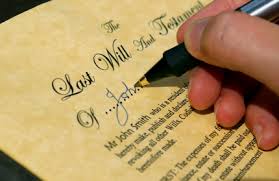Florida Probate Law: How Can a Person’s Estate Become an Intestate Estate Even if He or She Wrote a Florida Will?

What is an intestate estate? Did your mom or dad die without a will? Is the will that your husband wrote valid according to Florida law? What happens if someone’s will was not properly executed? What does it mean to contest a will? Did your spouse forget to sign his Florida will before he passed away? How can you contest a will in West Palm Beach? When should you contact a Florida inheritance lawyer to determine whether you have a strong will contest case?
What is an Intestate Estate?
West Palm Beach probate lawyers know that a person dies intestate when they die without a Florida will. In addition, a person could die intestate if they executed a will that is invalid or had a will that they revoked without executing a new will.
Florida Statute 732.101 states the following: (1) Any part of the estate of a decedent not effectively disposed of by will passes to the decedent’s heirs as prescribed in the following sections of this code (2) The decedent’s death is the event that vests the heirs’ right to the decedent’s intestate property.
Who Inherits If a Person Dies Intestate in Florida?
If a person dies intestate, or without a valid Florida will, his or her heirs will inherit. In other words, heirs at law are entitled to inherit the decedent’s property under Florida’s intestacy statutes. Heirs may include children, spouses, siblings, and parents, depending on a number of factors. If your spouse or parent dies without a will, you may have valuable inheritance rights under Florida law. For example, if you are a surviving spouse, you may want to read Florida Statute 732.102.
What Makes a Will Valid in Florida?
In order to create a valid will in Florida, estate lawyers know that there are requirements that must be met. Firstly, Florida Statute 732.501 states that any person who is of a sound mind and who is 18 years or older may execute a will. The person who is executing the will must have testamentary capacity. If he or she does not have testamentary capacity, or if the testator is proven to have been incompetent at the time he or she executed the will, the Florida will could be contested and deemed invalid by a probate court.
In addition to the requirements above, Florida wills must be executed in strict compliance with Florida Statute 732.502. Per this Florida Statute, a valid Florida will must 1) be in writing 2) be signed by the testator or another person at the direction and in the presence of the testator 3) be signed at the end 4) be signed in the presence of at least two attesting witnesses, and the witnesses must sign in the presence of the testator and each other.
What Happens if I Successfully Contest a Florida Will?
If a will was filed in your probate case that you believe to be invalid, you may want to consult with a West Palm Beach probate litigator regarding a will contest. If you can successfully prove that a Florida will was not executed properly, or was written by someone who was not of a sound mind, you could prevent the will from being admitted by the West Palm Beach or Miami probate court. If the person who wrote the invalid will has no other valid wills, the estate would become intestate and the person’s heirs would inherit.
At Pankauski Hauser, we are frequently hired to contest Florida wills and trusts. You may be able to contest a will if the testator, or the person who wrote the will, wrote it when they had Alzheimer’s or dementia. You can also contest a Florida will that was created under duress, or solely because someone unduly influenced the testator. As mentioned earlier, another reason a Florida will may be contested is if it is not properly executed according to Florida Statute 732.502.
Bitetzakisv. Bitetzakis
A recent Second DCA opinion, Bitetzakis v. Bitetzakis, is a great example of a case in Florida where a will is contested because the requirements in Florida Statute 732.502 were not strictly complied with. Here, the testator’s daughter appeals a probate court order admitting her father’s purported Florida will. The daughter argues that her father “did not sign the purported will within the meaning of the statute.” The will was not properly signed because the testator did not sign the will at the end of it, and he only signed his first name. The appellate court found the will to be invalid, and the court reversed and remanded. Here, if there are no prior valid wills, the Florida estate would now be probated as an intestate estate.
To interview a wills and trusts law firm in Florida, free of charge, call (561)268-0233 ext.101.